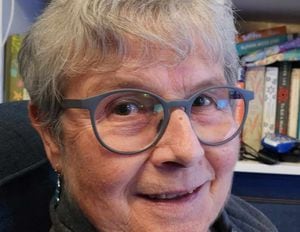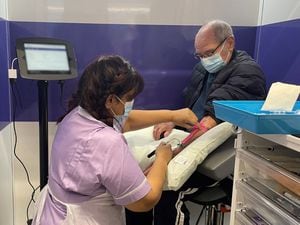Shropshire grandmother awaits transplant after optician spots rare eye condition
A retired Shropshire teacher is encouraging people to take regular eye tests after she was diagnosed with a rare condition that if untreated could leave her blind.

Susan Carrington, 76, from Craven Arms, was diagnosed with Fuchs Dystrophy, a rare disease of the cornea, after she went for a routine eye test in Bridgnorth.
The grandmother is now on a waiting list for a corneal implant, which will hopefully save her vision after she was diagnosed by optometrist Teresa Hughes at Specsavers in the town's High Street.
She said that during her routine eye test, the optometrist spotted what was originally thought to be a cataract, but was the rare de-generative condition, that if untreated would have taken Mrs Carrington's sight.
Mrs Carrington who is on a waiting list for a corneal transplant, said: "I’m unable to read without a magnifying glass anymore and also find difficulty using stairs - my husband has to guide me at those times, so it is significantly affecting my life at the moment.
"Once a cornea becomes available, I can have the cataract surgery followed by the implant surgery and my eyesight can start to improve and I can do all those things I took for granted again.
"I would encourage everyone not only to get their eyes checked out if they are worried about anything, but also to get regular eye checks so things like this can be diagnosed and treated as soon as possible, improving the long-term outcome."
Teresa Hughes at Specsavers Bridgnorth said: "It’s very important to diagnose Fuchs Dystrophy accurately as it can be confused with cataract or dry eyes as the symptoms are similar.
"Until recently treatment was an invasive graft which carries risks, but there is a fairly new procedure available for corneal surgery which far less invasive and carries far fewer risks and a greater success rate.
"However, there is a nationwide shortage of donor tissue so patients can be waiting for up to two years for an implant. If they also need cataract surgery it can be debilitating as the vision is impaired from both aspects, as in Mrs Carrington’s case.
"The key aspects to draw from this case are to raise awareness of the condition, let people know that treatments options have moved forward and they could be re-referred for the condition for potential surgery if they have not been seen in the last 10 years.
"And, most importantly, to emphasise the need for cornea donor tissue form organ donation. How wonderful if we could give the gift of sight to somebody else when we no longer need our vision?"





